一般疑问句课件
合集下载
小学英语语法一般疑问句和特殊疑问句PPT课件

2、如句子里是动词就在这些词前加 don't,doesn't,didn't
(1)主语是第一、二人称(复数)加don’t,第三人称单数加
doesn't
(2)如果是过去式就加didn't
例:I like dogs.
She likes swimming.
I don‘t like dogs.
She doesn’t like swimming.
A How B Where C What D Who
3.A: Was this book in the desk?
B: ___D____
A Yes,it is. B No,it was C Yes,it wasn’t D No,it wasn’t
4.A: ____A___ heavy is John?
Thank You !
e.g经营者提供商品或者服务有欺诈行为的,应当按照消费者的要求增加赔偿其受到的损失,增加赔偿的金额为消费者购买商品的价款或接受服务的费用
This is Amy's bike.(一般疑问句) Is this Amy's bike? Yes, this is. (肯定回答) No, this isn't. (否定回答) Did you go to Beijing last weekend? Yes, I did. (肯定回答) No, I didn't. (否定回答) I have some books. (一般疑问句) Do you have any books?
特殊疑问句
表示疑问,有疑问词(在开头),回答有很
多种可能。
常用疑问词:
When 什么时间 (问时间)
初中英语-疑问句(一般疑问句、特殊疑问句) PPT课件 图文
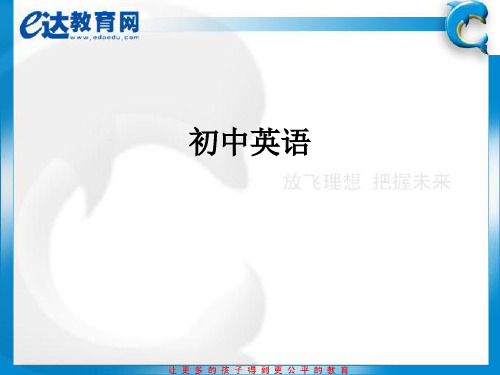
• 1.We are going to Hainan Island. Where are you going?
• 2.Chinese New Year this year is in February. When is Chinese New Year?
• 3.Kitty is wearing a special costume. Who is wearing a special costume?
which----Thing or person (对特定的人或事物提问)。
e.g “Which man is your English teacher?” “哪位是你的英 语老师?” “The man in white.” “那个穿着白衣服的。”
who----Person (对人提问)
e.g “Who will visit you tomorrow?” “My father.” “明天谁来看你?” “我爸爸。”
1.She is a pupil. Is she a pupil?
2. 她 是 学生。 是 她 学生 ?
2. I can see a star. Can you see a star?
3. My mother is a teacher.
Is your mother a teacher? 4. It will rain this afternoon.
flowers for your teachers?
Susan: No, I didn’t buy __a_n_y_ flowers, but I bought _so__m_e__ cards. Look!
Tom: Wow, how beautiful they are. Where did you buy them?
• 2.Chinese New Year this year is in February. When is Chinese New Year?
• 3.Kitty is wearing a special costume. Who is wearing a special costume?
which----Thing or person (对特定的人或事物提问)。
e.g “Which man is your English teacher?” “哪位是你的英 语老师?” “The man in white.” “那个穿着白衣服的。”
who----Person (对人提问)
e.g “Who will visit you tomorrow?” “My father.” “明天谁来看你?” “我爸爸。”
1.She is a pupil. Is she a pupil?
2. 她 是 学生。 是 她 学生 ?
2. I can see a star. Can you see a star?
3. My mother is a teacher.
Is your mother a teacher? 4. It will rain this afternoon.
flowers for your teachers?
Susan: No, I didn’t buy __a_n_y_ flowers, but I bought _so__m_e__ cards. Look!
Tom: Wow, how beautiful they are. Where did you buy them?
PEP人教版四年级小学一般疑问句讲解ppt课件
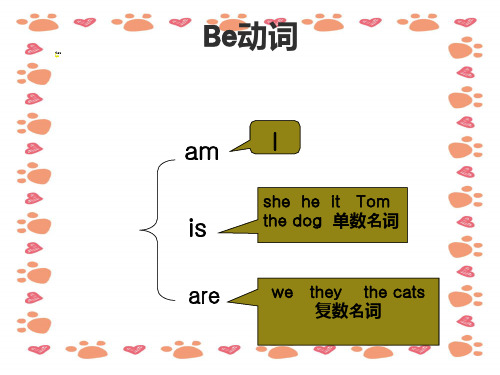
第一步:找
如
找到了 找 be动词、can
何
第二步:提
改
提 be动词、can 、
一
到句首(大写)
般
疑 问 句
第三步:改
①“句号”改“问号” 勿忘be动词
②如果有第一、第二
小诗
?
人称,则互改。
第四步:抄
其他照抄 一字不漏
Do some exercise 把下面的句子改成一 1.般Th疑is问is句a:nice pear.
他们会跳。 我们会单腿跳。
我会读书。 她会画画。
Do助动词
原形 第三人称
do does 1.Do you like apples?
Yes, I do. 肯定回答 No,I don’t. 否定回答 2. Doesshe like bananas? Yes, she does. 肯定回答 No,she doesn’t. 否定回答
We can help you. →can We help you. →Can you help me?
They can play football. →can They play football. →Can they play football?
Judge and answer
判断下面的句子是否是一般疑问句,为什么?
1. She is a pupil.
Is she a pupil? 2. I can see a star.
Can you see a star? 3. My mother is a teacher.
Is your mother a teacher?
本内容仅供参考,如需使用,请根据自己实际情况更改后使用!
放映结束 感谢各位批评指导!
小学英语一般疑问句课件

.
7
以助动词(do, does, did) 开头的一般疑问句。
.1 Do you do your homework in the evening? Yes, ______ ______.
2.Did you go swimming last weekend? No, ______ _______.
3.Did Amy visit her grandparents last weekend? No, _____ _____.
5 Sarha comes from the USA.改一般疑问句并肯定回答)
6 They often read books at home.(改. 一般疑问句并做肯定回答) 13
SUMMARY
什么是一般疑问句? 怎么回答? 有几种情况?
.
14
1 be动词: am, is, are, was, were
2 情态动词: can, may,will,must ,shall,should,could, might, would,need, …
3 助动词: do does did has/have(已经)
注意:
.
2
some在否定句, 疑问句中 要变成 any
Do you go to bed at nine o’clock?
.
4
5 I will go back in two days.
Will you go back in two days?
6 He can play football. Can he play football?
7 The children are singing.
5.____________________________________?
四年级下册英语课件:专项讲解 一般疑问句-join in剑桥英语 (共16张PPT)

No, there isn’t.
Yes, I am. 陈述句:We are happy.
Yes, it is. 一般疑问句:Are there any apples on the tree? 陈述句变一般疑问句的步骤
This/ That __i_s__ a car. 一般疑问句:I_s__t_h_i_s__/_t_h__a_t__a__car ? 肯定回答:Y_e_s__,_i_t_i_s_.__________ 否定回答:N_o_,__it__i_s_n_’_t_.________
My room __i_s__big. 一般疑问句:Is__y__o_u__r_r_o__o_m___b__ig? 肯定回答:Ye__s_,_i_t__is_.___________ 否定回答:N_o_,__it__i_s_n_’_t_.________
陈述句变一般疑问句的步骤 一般疑问句:_________________
1) I am a student. 肯定回答:___________________ __A_r_e_ ___y_o_u__ a student ? 否定回答:__________________
先用be的适当形式填空然后按照要求变换句型
2) They are bluHale Waihona Puke . I ____ a teacher.
___Is__ __h_e___ Zhang Peng? 5)There are some pictures on the window.
陈述句:He is my brother. be动词(am,is,are)+主语+其他成分?
4)Mike is a student . 3) He is Zhang Peng.
初中英语一般疑问句和特殊疑问句ppt课件
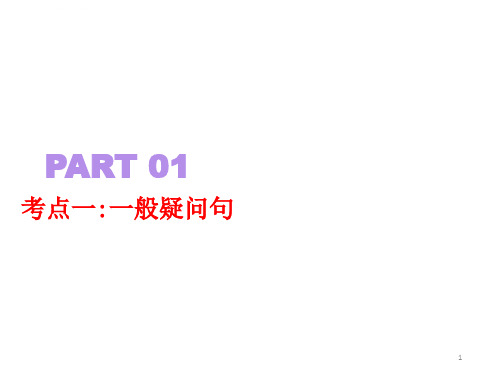
25
寒假来临,不少的高中毕业生和大学 在校生 都选择 去打工 。准备 过一个 充实而 有意义 的寒假 。但是 ,目前 社会上 寒假招 工的陷 阱很多
3.why引导的疑问句:询问原因 它的回答只能用because引导的原因状语从句。 Why are you late? Because I met the accident. Why didn’t you see the movie? Because I had seen it before.
一般疑问句主要有三种结构: ①Be+主语+其他? ②助动词+主语+谓语动词+其他? ③情态动词+主语+动词原形+其他?
Is he interested in going there? Does she often have colds? Can you speak Chinese?
3
寒假来临,不少的高中毕业生和大学 在校生 都选择 去打工 。准备 过一个 充实而 有意义 的寒假 。但是 ,目前 社会上 寒假招 工的陷 阱很多
6
寒假来临,不少的高中毕业生和大学 在校生 都选择 去打工 。准备 过一个 充实而 有意义 的寒假 。但是 ,目前 社会上 寒假招 工的陷 阱很多
Is English spoken all over the world?(被动语态) Yes, it is. No, it isn’t.
7
寒假来临,不少的高中毕业生和大学 在校生 都选择 去打工 。准备 过一个 充实而 有意义 的寒假 。但是 ,目前 社会上 寒假招 工的陷 阱很多
12
寒假来临,不少的高中毕业生和大学 在校生 都选择 去打工 。准备 过一个 充实而 有意义 的寒假 。但是 ,目前 社会上 寒假招 工的陷 阱很多
3. 情态动词的疑问式:情态动词的疑问式通常是将 情态动词置于句首:
寒假来临,不少的高中毕业生和大学 在校生 都选择 去打工 。准备 过一个 充实而 有意义 的寒假 。但是 ,目前 社会上 寒假招 工的陷 阱很多
3.why引导的疑问句:询问原因 它的回答只能用because引导的原因状语从句。 Why are you late? Because I met the accident. Why didn’t you see the movie? Because I had seen it before.
一般疑问句主要有三种结构: ①Be+主语+其他? ②助动词+主语+谓语动词+其他? ③情态动词+主语+动词原形+其他?
Is he interested in going there? Does she often have colds? Can you speak Chinese?
3
寒假来临,不少的高中毕业生和大学 在校生 都选择 去打工 。准备 过一个 充实而 有意义 的寒假 。但是 ,目前 社会上 寒假招 工的陷 阱很多
6
寒假来临,不少的高中毕业生和大学 在校生 都选择 去打工 。准备 过一个 充实而 有意义 的寒假 。但是 ,目前 社会上 寒假招 工的陷 阱很多
Is English spoken all over the world?(被动语态) Yes, it is. No, it isn’t.
7
寒假来临,不少的高中毕业生和大学 在校生 都选择 去打工 。准备 过一个 充实而 有意义 的寒假 。但是 ,目前 社会上 寒假招 工的陷 阱很多
12
寒假来临,不少的高中毕业生和大学 在校生 都选择 去打工 。准备 过一个 充实而 有意义 的寒假 。但是 ,目前 社会上 寒假招 工的陷 阱很多
3. 情态动词的疑问式:情态动词的疑问式通常是将 情态动词置于句首:
一般疑问句ppt课件

变化,对应的单词做变化。 三问号: 指把结尾的句号变成问号
.
注意: 1.遇 I(我)/we(我们)—you(你/你们)
Eg:陈述句:We are happy. 一般疑问句:Are you happy?
2.my(我的)—your(你的) Eg:陈述句:I am going to visit my grandparents this Sunday. 一般疑问句:Are you going to visit your grandparents this Sunday?
.
陈述句变一般疑问句:2.句子中有情态动词(can) 的,把情态动词提到句首。
一提、二变、三问号
Can Tthheeyycan play football ?.
.
Exercises2
1. I can skate . 2. _C_a_n____y_o_u___skate?
2.She can sweep the floor. __C__a_n__ _s_h_e__sweep the floor?
? Is Hhe is a student . 一提、二变、三问号
? Are Tthheeyy are teachers .
一提、二变、三问号
Are Tthheerree areasnoyme apples on the desk.?
.
Exercises1
1) I am from China. __A_r_e_ ___y_o_u__ from China?
.
一般疑问句做肯定,否定回答
Are you a student?
肯定回答:Yes , I am. 否定回答:No, I’m not.
肯定回答: Yes , 主+be动词/can/助.
.
注意: 1.遇 I(我)/we(我们)—you(你/你们)
Eg:陈述句:We are happy. 一般疑问句:Are you happy?
2.my(我的)—your(你的) Eg:陈述句:I am going to visit my grandparents this Sunday. 一般疑问句:Are you going to visit your grandparents this Sunday?
.
陈述句变一般疑问句:2.句子中有情态动词(can) 的,把情态动词提到句首。
一提、二变、三问号
Can Tthheeyycan play football ?.
.
Exercises2
1. I can skate . 2. _C_a_n____y_o_u___skate?
2.She can sweep the floor. __C__a_n__ _s_h_e__sweep the floor?
? Is Hhe is a student . 一提、二变、三问号
? Are Tthheeyy are teachers .
一提、二变、三问号
Are Tthheerree areasnoyme apples on the desk.?
.
Exercises1
1) I am from China. __A_r_e_ ___y_o_u__ from China?
.
一般疑问句做肯定,否定回答
Are you a student?
肯定回答:Yes , I am. 否定回答:No, I’m not.
肯定回答: Yes , 主+be动词/can/助.
一般疑问句(市一等奖)-课件
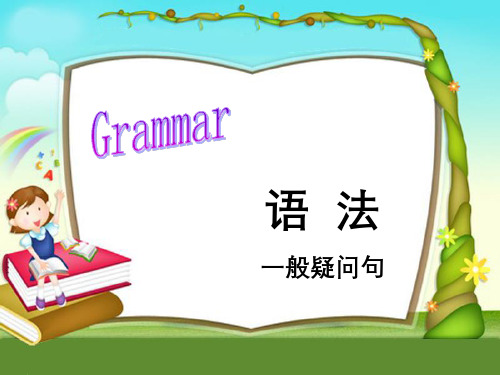
肯回:Yes, it is. 否回:No, it isn’t.
4. This is a table. 一般:Is this a table?
肯回:Yes, it is. 否回:No, it isn’t.
5. That is an orange. 一般:Is that an orange?
肯回:Yes, it is. 否回:No, it isn’t.
11. It is my pen. 一般:Is it your pen? 肯回:Yes, it is. 否回:No, it isn’t.
12. They are my friends. 一般:Are they your friends?
肯回:Yes, they are. 否回:No, they aren’t.
Vv Ww Xx Yy Zz
Is this a rubber? 这是块橡皮吗?
Yes, it is.
是的,它是。
No, it isn’t.
不,它不是。
Homework: ( 变一般疑问句,及肯否回答)
1. I’m Alice. 2. Tom is eight. 3. We are happy. 4. This is my umbrella. 5. That’s a rubber.
二、句型转换
1. She is Stella. 一般:Is she Stella?
肯回:Yes, she is. 否回:No, she isn’t.
2. He is Simon. 一般:Is he Simon?
肯回:Yes, he is. 否回:No, he isn’t.
3. It is Monty. 一般:Is it Monty?
6. They are boys. 一般:Are they boys?
4. This is a table. 一般:Is this a table?
肯回:Yes, it is. 否回:No, it isn’t.
5. That is an orange. 一般:Is that an orange?
肯回:Yes, it is. 否回:No, it isn’t.
11. It is my pen. 一般:Is it your pen? 肯回:Yes, it is. 否回:No, it isn’t.
12. They are my friends. 一般:Are they your friends?
肯回:Yes, they are. 否回:No, they aren’t.
Vv Ww Xx Yy Zz
Is this a rubber? 这是块橡皮吗?
Yes, it is.
是的,它是。
No, it isn’t.
不,它不是。
Homework: ( 变一般疑问句,及肯否回答)
1. I’m Alice. 2. Tom is eight. 3. We are happy. 4. This is my umbrella. 5. That’s a rubber.
二、句型转换
1. She is Stella. 一般:Is she Stella?
肯回:Yes, she is. 否回:No, she isn’t.
2. He is Simon. 一般:Is he Simon?
肯回:Yes, he is. 否回:No, he isn’t.
3. It is Monty. 一般:Is it Monty?
6. They are boys. 一般:Are they boys?
《一般疑问句》课件
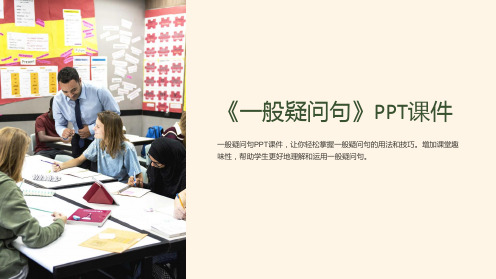
总结
• 一般疑问句用于向他人提问,通过主谓倒装和Yes/No回答。 • 特殊疑问句以特殊疑问词开头,用于询问特定信息。 • 通过练习掌握一般疑问句、Yes/No问答和特殊疑问句的使用。 • 巩固并应用一般疑问句,提高沟通表达能力。
《一般疑问句》PPT课件
一般疑问句PPT课件,让你轻松掌握一般疑问句的用法和技巧。增加课堂趣 味性,帮助学生更好地理解和运用一般疑问句。
什么是一般疑问句?
1 定义
2 重要性
一般疑问句是用于向对方提问的句型,通 过倒装询问陈述句的真实性或肯定/否定的 回答。
学习一般疑问句有助于提高语言表达能力, 使对话更加生动有趣。
一般疑问句的句型结构
1
基本句型
一般疑问句的基本句型是:助动词 +
主谓倒装
2
主语 + 谓语。
当主语为第三人称单数,或以非be动
词开头时,需要将主语和谓语进行倒
ห้องสมุดไป่ตู้装。
3
示例
一般疑问句的示例:Are you ready? Can he swim? Did they finish the project?
Yes/No问答
1 回答方式
Yes/No问答是对一般疑问句进行肯定或否定回答,可以直接简略回答或使用完整句子回 答。
2 缩略回答
缩略回答只使用动词和be动词“是”或“不是”的形式,如“Yes, I am.” 或“No, he isn't.”
特殊疑问句
1 定义
特殊疑问句是用于询问特定信息的句型,常以特殊疑问词开头。
2 句型结构
特殊疑问句的句型结构是:特殊疑问词 + 助动词(be动词) + 主语 + 谓语(其它动词)。
《一般疑问句》课件

03
一般疑问句的用法
询问信息
总结词
一般疑问句常用于询问对方的信息,以了解对方的观点、意见或情况。
详细描述
在英语中,一般疑问句通常以助动词(如be、do、have等)开头,后面跟着主语和谓语,结尾用问 号。例如:“Do you like music?”这句话是询问对方是否喜欢音乐。
请求确认
总结词
用反义疑问句回答
总结词
强调肯定或否定
详细描述
使用反义疑问句来回答一般疑问 句,可以强调肯定或否定的态度 。这种回答方式通常用于加强语 气或表达强烈的观点。
05
一般疑问句的注意事项
注意语调的变化
总结词
语调的变化对于一般疑问句的表达至关重要。
详细描述
在陈述一般疑问句时,语调的升降可以影响句子的意义。通常,疑问句的语调会上升, 以表示询问或不确定的态度。通过调整语调,可以更准确地传达句子的含义,避免产生
要点二
详细描述
在某些正式场合或商业交流中,可能需要更加严谨和规范 的表达方式。而在非正式场合或日常交流中,则可以更加 随意和轻松。因此,在表达一般疑问句时,需要根据具体 的语境和场合选择合适的表达方式,以确保达到最佳的表 达效果。
THANK YOU
感谢观看
02
一般疑问句的构成
主语+谓语+其他成分
总结词
这是最简单的一般疑问句结构,其中 主语是句子中的主要名词或代词,谓 语是表示动作或状态的动词,其他成 分可能包括宾语、定语、状语等。
详细描述
例如,“Do you want to go to the movies?” 这个句子中,“you”是 主语,“want”是谓语,“to go to the movies”是其他成分。
一般疑问句和特殊疑问句课件
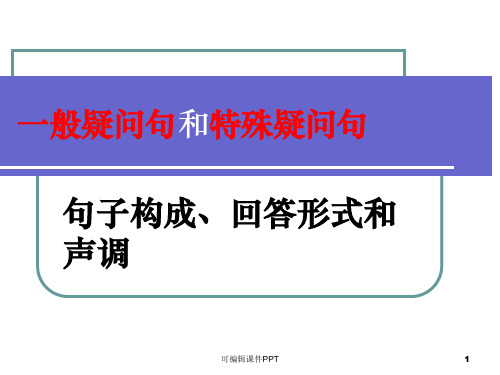
2.陈述句中有情态动词(can、 may、must …)时,可直接将 它们提至主语前,即可成为一般 疑问句.
He can swim now. → Can he swim now﹖
可编辑课件PPT
7
注意事项 陈述句变一般疑问句:
3.陈述句中只有一个实义动词作谓语。 当时态为一般现在时,变为一般疑问句时 要在句首加do或does, 主语后的实义动 词用原形。当时态为一般过去时,变为一 般疑问句时要在句首加did, 主语后的实 义动词用原形。如:
Did he go to Guangzhou yesterday?
可编辑课件PPT
9
特殊疑问句
以疑问词开头: what, who, whose, which, when, where, why, how, how many, how much, how old 等。 (1) Where are you from? (2) Who is he? (4) How many girls are there in your class? (5) Which film star do you like best?
一般疑问句和特殊疑问句
句子构成、回答形式和 声调
可编辑课件PPT
1
一般疑问句
一般疑问句是疑问句的一种。
定义: 它是指用yes(是)或no (否)来回答的句子。
可编辑课件PPT
2
一般疑问句
(1) Is Han Mei in Class Four? (2) Can you spell your name, please? (3) Does he go to school every day?
翻译练习
1. 你们喜欢英语吗?
2. 我真的需要这些规则吗?
He can swim now. → Can he swim now﹖
可编辑课件PPT
7
注意事项 陈述句变一般疑问句:
3.陈述句中只有一个实义动词作谓语。 当时态为一般现在时,变为一般疑问句时 要在句首加do或does, 主语后的实义动 词用原形。当时态为一般过去时,变为一 般疑问句时要在句首加did, 主语后的实 义动词用原形。如:
Did he go to Guangzhou yesterday?
可编辑课件PPT
9
特殊疑问句
以疑问词开头: what, who, whose, which, when, where, why, how, how many, how much, how old 等。 (1) Where are you from? (2) Who is he? (4) How many girls are there in your class? (5) Which film star do you like best?
一般疑问句和特殊疑问句
句子构成、回答形式和 声调
可编辑课件PPT
1
一般疑问句
一般疑问句是疑问句的一种。
定义: 它是指用yes(是)或no (否)来回答的句子。
可编辑课件PPT
2
一般疑问句
(1) Is Han Mei in Class Four? (2) Can you spell your name, please? (3) Does he go to school every day?
翻译练习
1. 你们喜欢英语吗?
2. 我真的需要这些规则吗?
一般疑问句 ppt课件

He is drawing.
4.你的哥哥正在写。 Your brother在吃桔子。My father is eating an apple.
6.我的妈妈正在来。 My mother is coming.
ppt课件
21
ch_rr_ w_ t_ rm _ l_ n
ppt课件
16
变否定句:
1.I can dance
I can not dance
2.She can jump
She can not jump
3.I can write.
I can not write.
4.He can draw an orange. He can not draw an orange.
Those grapes are sour . Those grapes are sweet . (选择疑问)
eat-eating dance-dancing write-writing come-coming 例: 我正在读。
I am reading.
ppt课件
20
1.我正在读一本书。 I am reading a book.
2.我的妹妹正在跳舞。 My sister is dancing.
3.他正在画。
4、She is six years old.
Is she six years old?
5、He is a boy. (男孩)
Is he a boyp?pt课件
5
变一般疑问句:
1、This is an ear. Is that an ear ?
2、It is your stick. Is it your stick?
ppt课件
一般疑问句讲解及专项练习ppt课件
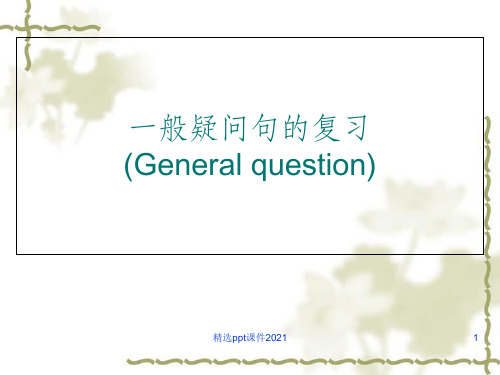
精选ppt课件2021
2
❖5.Does your mother work in the cinema? ❖ No,she doesn't. ❖6.Are they going to take a trip? ❖ Yes,they are. ❖7.Did you go skating on your holiday? ❖ Yes,I did. ❖8.Did John read a book yesterday? ❖ No,he didn't.
精选ppt课件2021
11
Homework
作业本: ❖ 分别用be动词 (are, is),情态动词(can),助动词 (do, does, did) 造句,用上陈述句,一般疑问 句,肯定回答和否定回答,不少于5句。
精选ppt课件2021
12
感谢亲观看此幻灯片,此课件部分内容来源于网络, 如有侵权请及时联系我们删除,谢谢配合!
Are there any teachers in your classroom?
Yes,there are. No,there aren't.
精选ppt课件2021
7
一般疑问句语调为升调
精选ppt课件2021
8
一般疑问句
General question
概念 结构 变化 回答 语调
精选ppt课件2021
一般疑问句的复习 (General question)
精选ppt课件2021
1
根据图片回答问题.
❖ 1Are you watching TV? ❖ Yes,I am. ❖ 2.Is he short and strong? ❖ No,he isn't. ❖ 3.Can Sarah do the dishes? ❖ Yes,she can./Sure./Of,course. ❖ 4.Do you go to school by bike? ❖ Yes,I do.
- 1、下载文档前请自行甄别文档内容的完整性,平台不提供额外的编辑、内容补充、找答案等附加服务。
- 2、"仅部分预览"的文档,不可在线预览部分如存在完整性等问题,可反馈申请退款(可完整预览的文档不适用该条件!)。
- 3、如文档侵犯您的权益,请联系客服反馈,我们会尽快为您处理(人工客服工作时间:9:00-18:30)。
怎样将陈述句变成一般疑问句?
• 1.公式法: Be+主语+抄+? Can+主语+抄+? Do/Does/Did+主语+抄+?
• 2.歌谣法:
• Can和be,往前提, • 遇见I、We变成you, • Am跟着变成are, • 两答时候变回来。 • 没有遇见Can和be, • Do或Does加在前。
2. He is a drum player. Is he a drum player?
3.She can sing English songs. Can she sing English songs?
这道题有点难:
• I want to play the guitar. • Do you want to play the guitar?
一般疑问句
请记住这几个关键词:
• 1.Be动词:有is 、am、are三种形式, is和am的 过去式是was, are的过去式是were。
• 2.Can是情态动词。 • 3.基本助动词:有do、does和did三种形式。
可以归纳为就记住: is, am, are, was, were can do, does 和did这九个词。
本课小结:
• 1.几个关键词: is,am,are,was,were,can,do,does和did。
2.什么叫一般疑问句?
3.变一般疑问句的方法:公式法和歌 谣法。
4.知识拓展:注意some与any的转换, 实意动词中的三单的变化。
请你仔细观察演变过程:
• 1.He is in the sixth grade.
Is 2.
he in the sixth grade?
3.They are dogs.
4. Are they dogs?
我来做一做:
把下列句子变成一般疑问句: • 1.Xiaoxiao is the best singer. • Is Xiaoxiao the best singer?
肯定回答: Yes, She does.
否定回答: No, She doesn’t.
试一试:把句子变成一般疑问句并 且肯定回答和否定回答。
• 一般疑问句:
• 1.They are guitars. • Are they guitars?
• 肯定回答: • Yes, they are. • 否定回答: • No, they arebaseball.
一般疑问句:
Can you play baseball?
肯定回答: Yes, I can.
否定回答:
No, I can‘t.
小小擂台赛:将下列句子变成一般 疑问句,并且肯定回答和否定回答
• 1. She is a vet..
Is she a vet? Yes, she is
质疑:
• 一.什么叫一般疑问句? 答:用来提出疑问,并且能够用yes或 no来回答的句子。
仔细观察一般疑问句的结构:
• 归纳:一般疑问句的构成:由be动词/can/助 动词+主语+……+?构成。
•1. Is this a car? •2. Are you a boy? •3. Am I right? •4. Can you play computer games? •5. Do you like learning English? •6. Does he study English well?
No, she isn’t.
2.He can fly kites
Can he fly kites? Yes, he can. No, he can’t.
3. I like playing the piano. 4.I’m a student.
Do you like playing the piano.
Are you a student?
Yes, I do. No, I don’t.
Yes, I am. No, I’m not.
知识拓展:
• 1.I have some apples. • Do you have any apples?
• 2.He wants to participate in the show. • Does he want to participate in the show?
一般疑问句的回答:
• 请记住两点:
1.先用yes或no来回答。 2.问谁答谁
例1:
• Is he a drummer?
肯定回答: Yes, he is.
否定回答: No, he is not.
例2
=No, he isn’t. =No, he ’s not.
Does she play the violin?
